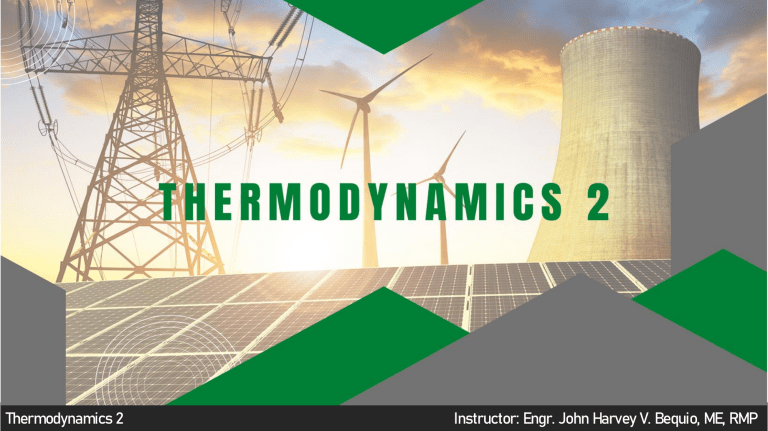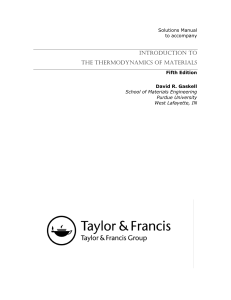
Thermodynamics 2 Instructor: Engr. John Harvey V. Bequio, ME, RMP Module 4: Reheat Cycle Reheating minimizes moisture content and at the same time increases the efficiency of the cycle. Thermodynamics 2 Module 4: Reheat Cycle Reheating minimizes moisture content and at the same time increases the efficiency of the cycle. Thermodynamics 2 Module 4: Reheat Cycle Thermodynamics 2 Module 4: Reheat Cycle Ideal Reheat Cycle: Working Principle In Figure (a), Heat is added (QAB) in the boiler to generate steam (Point 1). Ideally, 100% of the generated steam enters the steam turbine. As the engine receives the steam, partial expansion will occur. The steam (Point 2) will now enter the reheater and the addition of heat (QAR) will be needed in order to reheat the steam at a higher temperature before entering the turbine again. Reheating minimizes the moisture content. The turbine will receive the reheated steam (Point 3) and now ready for complete expansion. High-pressure steam will release energy which will be converted into useful energy or simply say the work of a turbine (WT). Releasing energy in the steam will cause a decrease in pressure. Then, the low-pressure steam (Point 4) will enter the condenser. After heat rejection (QR) in the condenser, the steam will condense and becomes a saturated liquid (Point 5). A feedwater pump will be necessary to push the liquid into a higher pressure component. Feedwater (Point 6) will be pushed by a feedwater pump (WP) with a little amount of energy into the boiler. Thermodynamics 2 Module 4: Reheat Cycle Thermodynamics 2 Module 4: Reheat Cycle Thermodynamics 2 Module 4: Reheat Cycle Thermodynamics 2 Module 4: Reheat Cycle Thermodynamics 2 Module 4: Reheat Cycle Thermodynamics 2 Module 4: Reheat Cycle Thermodynamics 2 Module 4: Reheat Cycle Thermodynamics 2 Module 4: Reheat Cycle Thermodynamics 2 Module 4: Reheat Cycle Thermodynamics 2 Module 4: Reheat Cycle Thermodynamics 2 Module 4: Reheat Cycle Thermodynamics 2 Module 4: Reheat Cycle Thermodynamics 2 Module 4: Reheat Cycle Thermodynamics 2 Module 4: Reheat Cycle Thermodynamics 2 Module 4: Reheat Cycle Thermodynamics 2 Module 4: Reheat Cycle Thermodynamics 2 Module 4: Reheat Cycle Thermodynamics 2 Module 4: Reheat Cycle Thermodynamics 2 Module 4: Reheat Cycle Thermodynamics 2 Module 4: Reheat Cycle Thermodynamics 2 Module 4: Reheat Cycle Thermodynamics 2 Module 4: Reheat Cycle Thermodynamics 2 Module 4: Reheat Cycle Thermodynamics 2 Module 4: Reheat Cycle Thermodynamics 2 Module 4: Reheat Cycle Thermodynamics 2 Module 4: Reheat Cycle Thermodynamics 2 Module 4: Reheat Cycle The Actual Reheat Cycle Thermodynamics 2 Module 4: Reheat Cycle Thermodynamics 2 Module 4: Reheat Cycle Thermodynamics 2 Module 4: Reheat Cycle Thermodynamics 2 Module 4: Reheat Cycle Thermodynamics 2 Module 4: Reheat Cycle Thermodynamics 2 Module 4: Reheat Cycle Thermodynamics 2 Module 4: Reheat Cycle Thermodynamics 2 Module 4: Reheat Cycle Thermodynamics 2 Module 4: Reheat Cycle Thermodynamics 2 Module 4: Reheat Cycle Thermodynamics 2 Module 4: Reheat Cycle Thermodynamics 2 Module 4: Reheat Cycle Thermodynamics 2 Module 4: Reheat Cycle Thermodynamics 2

